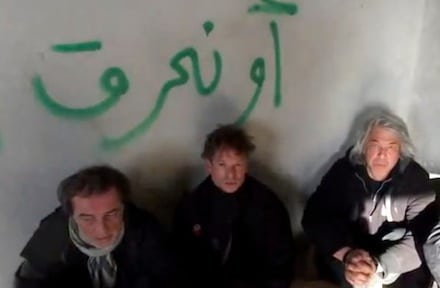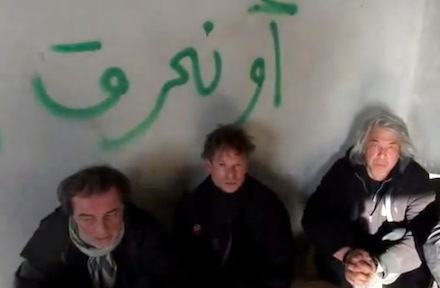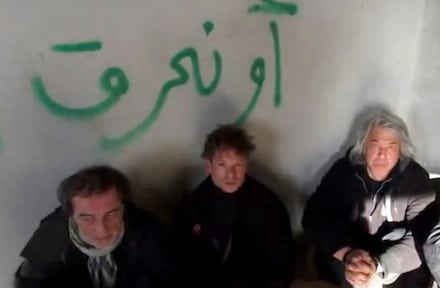

NBC’s Richard Engel in ‘false flag’ kidnapping.
It has been confirmed that TV journalist Richard Engel’s kidnapping/rescue in norther Syria in late 2012 was a hoax. NBC management knew the story was probably false but proceeded to broadcast it anyway.
There are at least two good things about “Engelgate”:
Some analysts have noted that the Engel/NBC deception is more serious than that of Brian Williams. In the Williams case a TV journalist was puffing himself up; in the Engel deception, public policy involving war and bloodshed was being influenced.
Will this confirmation of deception lead to any more skepticism about reports from and about Syria? Will there be any more critical or skeptical look at stories that demonize the Syrian government and favor the western narrative? We have a test case right now.
HRW report on “Chlorine Gas Attacks”
On April 13, Human Rights Watch (HRW) issued a report “Syria: Chemicals Used in Idlib Attack.” It begins: “Evidence strongly suggests that Syrian government forces used toxic chemicals in several barrel bomb attacks in Idlib.” HRW Deputy Director Nadim Houry accuses the Syrian government of “thumbing its nose at the (UN) Security Council and international law yet again.”
We note that the reported chlorine gas attacks took place in the exact same area where Richard Engel was kidnapped. As shown in this map, the Engel hoax took place near Maarat Misrin. The alleged Chlorine attacks took place in the adjacent towns of Binnish, Qmenas and Sarmin. The rebel/terrorists were aware of the political ramifications of the kidnapping and rescue hoax in 2012. And now, in 2015, they are very aware of the political implications of the use of chlorine gas.
Certainly, opposition fighters have the motive and the incentive to implicate or “frame” the Syrian government in the use of chlorine gas. Do they have the means? This area is very close to the border with Turkey. Just as opposition brought in Richard Engel and many other western journalists via Turkey, so could they bring in chlorine gas or just about any other weapon.
Eight Significant Problems with the Report
Let us now look at specific problems with the HRW report.
1. The HRW report relies heavily on testimony and video/photo evidence from a biased source known as “Syria Civil Defence.” This organization is not what one might assume. Syria Civil Defence was funded and created by UK and US. Initial training was provided in Turkey by former British military officer and current contractor based in Dubai. In the past year Syria Civil Defence has been rebranded as “White Helmets” by “The Syria Campaign” which itself is the creation of corporate PR firm. Syrian Civil Defence (aka White Helmets) is heavily into social media and actively campaigning for a “No Fly Zone.” The HRW report does not include any of the preceding information on Syria Civil Defence, its origins and obvious bias. Shouldn’t “evidence” received from them be considered with a skeptical eye?
2. The photos and videos referenced in the HRW report are unconvincing. Many of the video links in the HRW report do not work. However, many of the videos can be viewed at the Syrian research wiki A Closer Look at Syria. (See the discussion page of the Alleged March 16 Chlorine Attack for video links and comments regarding anomalies in the videos.)
Video of the three dead children is tragic but it’s questionable how they actually died. Scenes from the medical clinic indicate illness but not the cause. Scenes showing the “proof” of a “barrel bomb” containing “chlorine cylinders” is highly dubious. Some of the scenes are almost comical with one person in full hazmat gear, another with mask and another casually with hands in pocket and no mask at all. Then we have someone talking to camera with a bulldozer and some scrap metal on the ground. Then there is the figure holding what they report as a container with a “red liquid”. See sample photos at bottom.
3. The HRW report includes assertions without reference or evidence. For example, “Syrian forces have previously dropped barrel bombs embedded with cylinders of chlorine gas.” and “Syrian government’s previous use of chlorine, suggest this chemical.” What is the source and evidence to support these debatable assertions?
4. The HRW report includes false assertions. For example, the report says, “First responders saw and filmed remains of barrel bombs, which can only be delivered by aircraft.” This is not true. Bombs can be exploded on the ground and rebel/terrorists routinely fire gas cylinders from launchers on the ground. See this photo. The implication that chlorine gas attacks can only be done from the air is, of course, nonsense. Chemical warfare and chlorine gas attacks, as executed in World War I, were entirely done from ground based projectiles.
5. The HRW report ignores the issue of motivation and incentive. Normally an investigation will consider the issue of motivation and who benefits from an event or crime. In this case, the Syrian government has nothing to gain and everything to lose by using chlorine gas. Especially after the UN Security Council made a specific resolution regarding use of this industrial gas, why would they arouse world ire and hostility against themselves by using this weapon? Why would they do that when they have conventional explosive weapons which are more deadly? On the other hand, the ones to benefit from such an accusation against the Assad government are the armed opposition and other proponents of a “No Fly Zone” in northern Syria. How better to frame an adversary in the arena of public opinion? These considerations are curiously lacking in the HRW report. Perhaps that is because the conclusions of the report are at odds with common sense and objective inquiry.
6. The HRW report attempts to buttress new accusations by referring to old and discredited accusations. After the highly publicized events in Ghouta in August 2013, “Human Rights Watch concluded that the evidence strongly suggested that Syrian government authorities used the nerve agent Sarin in attacks on two Damascus suburbs.” Since that time, the HRW analysis has been effectively discredited. Seymour Hersh wrote a two part series of articles which concluded that the chemical attack in Ghouta was by anti-government rebels assisted by Turkey. Another investigative reporter with a proven track record, Robert Parry, directly addressed and discounted HRW’s analysis. Parry concisely summed up the HRW analysis as a “junk heap of bad evidence”. Even the head of the UN Inspection Team, Ake Sellstrom, has acknowledged that the early predictions of missile distance were mistaken. Why has HRW not reviewed and updated its analysis, which they rushed out ahead of the UN report? Instead, it seems they are relying on an old faulty report to justify a new faulty report.
7. The HRW report ignores history of Nusra/al-Qaeda use of chemical weapons. The HRW report ignores the evidence that Nusra rebels previously used chemical weapons. For example, UN investigator Carla del Ponte reported there was “strong, concrete evidence” pointing to Nusra rebels having used sarin. There were numerous credible reports of Nusra and other rebel/terrorist organizations possessing sarin.
8. The HRW report ignores the fact that Nusra rebels had control of the major chlorine gas producing factory and stockpile in northern Syria. As reported in a Time magazine article, the major chlorine gas producing factory in northern Syria was over-run and seized by Nusra rebels/terrorists in late 2012. The owner of the factory said “ if it turns out chlorine gas was used in the attack, then the first possibility is that it was mine. There is no other factory in Syria that can make this gas, and now it is under opposition control.” The factory owner reported there were about 400 steel cylinders of chlorine gas, one Ton each, captured by Nusra/Al Queda along with the factory.
The article included the following prescient comments, delivered when chlorine gas usage was first reported:
To Faris al-Shehabi, head of the Aleppo Chamber of Industry and a strong government supporter, it was obvious from Day One that the rebels had their eyes on the gas. ‘Why else would they capture a factory in the middle of nowhere? For the sniper positions?’ he asks sarcastically while meeting TIME in Beirut, where he is traveling for business. ‘We warned back then that chemical components were in the hands of terrorists, but no one listened.’
Was HRW not aware of these important facts or did they think them not relevant?
Conclusion
Hopefully the Engel/NBC hoax will increase public skepticism and critical examination of claims by Syrian “rebels” and their advocates. It should also lead to more scrutiny of media stories, human rights group reports, and the words and actions of US government officials.
Unfortunately, since the exposure of the Engel/NBC hoax, Western media and US diplomatic staff have not reduced their bias. A forthcoming article will expose lies and blatant bias on Syria by Robert Siegel of NPR and Ambassador Samantha Power, head of the US Mission to the United Nations.
As for Human Rights Watch, their previous bias and “revolving door” with US Government was criticized in a devastating letter to HRW from numerous Nobel Peace Laureates.
It would be a positive sign for HRW to change their staff policy as proposed by the Nobel Laurate group. It would mark another dramatic and positive sign for HRW to reconsider their report on Chlorine Gas Attacks in Syria taking into account the serious shortcomings identified in this article.
As it stands, the biased and faulty conclusions of the HRW report are much more serious than either Engelgate or the Brian William pretense. The HRW report is receiving wide coverage and is being used to justify actions which might move the region closer to even greater war and bloodshed.
Reprinted with author’s permission from Counterpunch.

